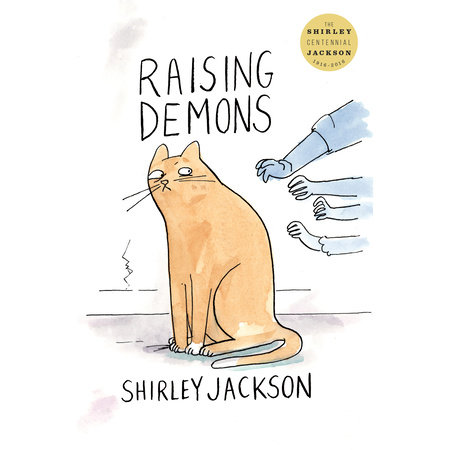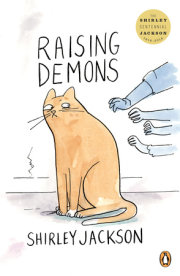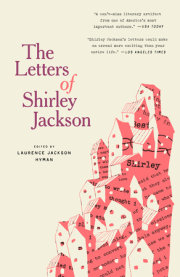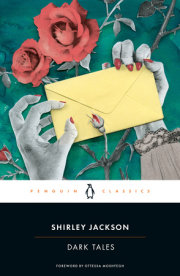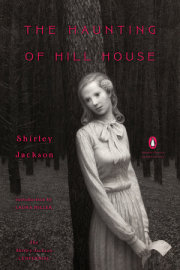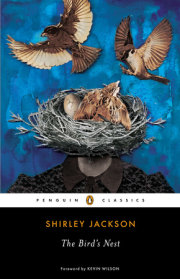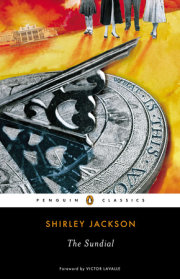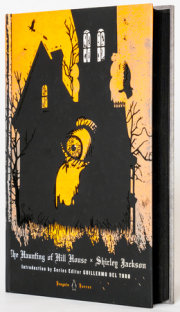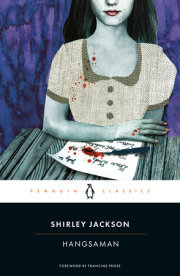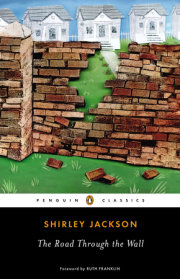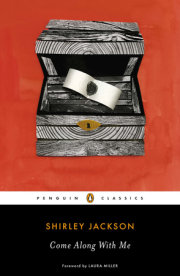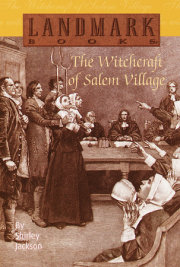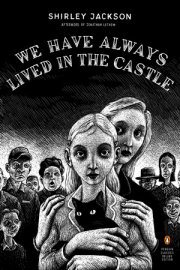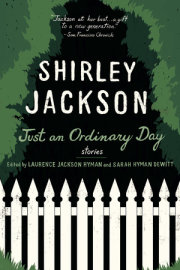I do not now have the slightest understanding of the events which got us out of one big white house which we rented into another, bigger white house which we own, at least in part. That is, I know we moved, and I think I know why, and I know we spent three pleasant months in a friend’s summer home, and I am pretty sure we got most of our own furniture back. What really puzzles me, I suppose, is how a series of events like that gets itself started. One day I went to clean out the hall closet and the next thing I knew we were trying to decide whether to have all four phones put on one line, or leave them all different numbers and list ourselves four times in the phone book. We decided wrong, by the way. What with the phone starting to ring for Laurie at eight in the morning and for Jannie about noon and for Sally in the early afternoon and every now and then—a high, uncomfortable voice, stammering and usually hanging up unexpectedly—for Barry, we know now that we should have left the four phones separate. We should have listed three of them for the children and kept the fourth one private, giving out the number to the two or three people who either have no children of their own or are still optimistic enough to try to telephone their friends.
We had rented the big white house for nine years. Sally had been born while we lived there, and so had Barry, and the kitchen needed repainting. The stairs and the walls and the positions of the light switches and the crack in the glass of the front door had all become affectionate and familiar to us. Laurie knew the bike routes to everywhere in town from the house, Jannie could cross the street to play with a friend, Sally had slept in Jannie’s old carriage on the front porch, where Barry now slept, the shadows of the pillars moving slowly across the plaid carriage robe. All the millions of things we possessed as a family were inside the house, but, inexorably, there came one shocking moment when we discovered that the house was full.
I went, one spring morning, to clean out one of those downstairs half-closets, which begin as very practical affairs, meant to be the resting place for wet boots and umbrellas, and end up as containers for ice skates and then hockey sticks and then tennis rackets and then, by the most logical of extensions, baseball gloves and football helmets and basketballs and riding boots and jackets left behind by visiting children. I had picked up a big cardboard carton at the grocery, and into it I put the baseball gloves and the football helmets and the riding boots and the tennis rackets and the basketball. I put the carton at the foot of the back stairs, so I would remember to take it up the next time I went, and I put clean newspaper on the floor of the closet and went and got all the wet boots from the corner of the kitchen and the spot inside the front door and the back seat of the car, and I lined the boots up in the closet and derived an enormous satisfaction from closing the closet door tight for the first time in months.
Later when I went upstairs I took the carton with me. There was no room for it in the bedroom shared by my two daughters. There was no room for it in the bedroom of my older son, and certainly no room for it in the tiny room where the baby lived. There was no room for it in the attic where we kept sleds and garden rakes. There was no room for it in the attic where we kept trunks and boxes of things I meant to give away someday. I knew there was no room for it in the garage because I had tried a day or so before to put the snow tires in there and had finally to put them in the cellar, consequently there was no room in the cellar because I had barely been able to squeeze in the snow tires. I was not going to leave a carton of football helmets and a basketball in the bedroom which my husband and I shared, particularly since there were already sixteen cartons of books in the corner next to my closet, and I could not leave it in the upstairs hall because there were nine more cartons of books lined up along that wall. Anyway I knew if I left a carton of baseball gloves and football helmets and a basketball right out in the front hall it would only be a day or so before I had to gather them all up again from the living room and the kitchen, and I would probably have to put them all back into the hall closet and then the door would not close again.
With a certain feeling of bewilderment, and a strong sense of the inevitability of fate, I took the carton back downstairs and put everything directly back into the hall closet, and of course the door would not close. I could not find anywhere to put the empty carton, so I took it outside and left it for the garbage man.
A day or so later I decided to put away the winter clothes in moth balls, but the closet I have always used for winter storage was full of boxes holding the baby’s clothes and gifts people had sent him, because there was no closet in the small room where we put the baby. It occurred to me that I could put the winter clothes away in a trunk in the far attic, but when I finally got the attic door open I discovered that the trunk was full; my husband had cleaned his filing cabinet and when there was no place to put the papers and correspondence and clippings which were too important to be thrown away but not of any immediate usefulness, like our old college yearbook and the copy of our marriage license, he had carried them up in the laundry basket and put them all away in the trunk in the far attic. I thought that I might buy a cardboard closet to put the clothes away in, but there would be no place to put a new closet, since both the attics were full, unless I put a closet in the baby’s room and moved the baby’s things out of the moth closet and then put the winter clothes in the old moth closet, but then there would be no place to put the baby, because there was only just room enough in his little room for his crib, and I had to take him in on the girls’ bed to dress him.
We had three more attics, but one of them was full of old lumber and bricks left over from the various additions that had been built onto the house, and one of them was full of bats, and the last could only be reached by climbing through a trapdoor in the ceiling of the next-to-the-last attic and even if I could get past the bats and through the lumber and bricks I did not think I could keep taking the baby up and down through a trapdoor.
That night at dinner my husband remarked that he wished he could get to his place at the dining room table without having to squeeze so past the buffet; either he was putting on weight, he pointed out, or I had moved the table. I said that now we had the baby’s high chair in the dining room because there was no place to put it in the kitchen I could not possibly have the dining room table any farther away from the buffet because if there were any less space around the kitchen doorway I would not be able to get in and out at all, and no one would get any dinner. My husband said why not give all the children their dinners around the kitchen table, thus making considerably less congestion and confusion in the dining room at dinnertime, and I had to explain that if I put chairs for all the children around the kitchen table at dinnertime I would have to go around through the study to get from the stove to the sink, and Laurie added indignantly that that was a fine thing, that was, to expect him and the girls to eat in the kitchen and let the baby eat in the dining room.
After dinner Laurie had a friend in to watch television, so my husband and I had to sit in the study. Jannie came in to read in the study because the boys asked her please kindly to let them alone while they were seeing the western movie; Sally was asleep upstairs with the lights out so Jannie could not read in bed, and the light in the dining room was not good enough to read by. With three of us in the study someone had to sit in a straight chair, so I thought I might as well get some mending done and let Jannie have the comfortable chair with the reading light. When I went to get my sewing basket I found that it was full of walnuts the children had brought home. They had not been able to find any place to put the walnuts until we decided what to do with them, so they had put them in my sewing basket, which was already pretty full of socks. Later, when I went upstairs to look at the baby I perceived, seeing almost for the first clear time, that both sides of the staircase were lined with things—books, sweaters, dolls, boxes of crayons—which had been put there temporarily and then left because there was no place else to leave them. I came downstairs and went into the study and stood in front of my husband until he put down his book and looked at me.
“We have too much stuff,” I told him. “Dolls and hockey sticks and winter clothes and walnuts.”
“I thought there seemed to be more around than usual,” he said.
“There is no more room in this house,” I said. “We cannot fit in one more thing. Not one.”
Jannie lifted her head. “Ninki is going to have kittens again,” she said.
“Well, she can’t have them here,” I said. “There isn’t an inch—”
“Last time she had them in the green living room chair.”
“When I went by a few minutes ago there were four or five jackets and a pile of library books on that chair,” I said.
“Start asking people now if they want kittens,” my husband said. He picked up his book again. “Return the library books,” he added, with the air of a man settling a petty domestic problem.
“We have got to get a bigger house,” I said.
“Don’t be silly,” my husband said, reading. “There is no bigger house.”
“A new house?” said Jannie. “Can I have a room of my own?”
When I went down to the grocery the next morning the grocer said he heard we were thinking of moving. We’d been in the old Fielding house quite a while now, he said; perhaps now we were aiming to buy? He had heard, just by accident, that Mrs. Wilbur wanted to sell that big place on upper Main Street. It would be good for us to be living on upper Main Street, because then the kids could walk to school, not to mention being right in the school district so Sally could get into the kindergarten. While I was out with the car, he said, I ought to go on up Main Street and take a look at the big house from the outside. “You’ll know it by the gateposts,” the grocer said.
When I went into the post office the postman said he heard we were thinking of moving. While we were about it, he suggested, we ought to think of getting a house closer in to town. Then we could get our mail in a postbox in the post office instead of having to wait for Mr. Mortimer to come round with the rural delivery, because now that Mr. Mortimer was getting on, and particularly since the day Mr. Mortimer’s car skidded and went into the ditch, which they hadn’t been able to get parts for it because it was so old, well, the postman said, it must be something of a trial to us not to be getting our mail till three, four o’clock in the afternoon. Did I know that Millie Wilbur was thinking of putting that big house on the market? The one upstreet, with the gateposts? Wouldn’t hurt the price of eggs to have a look at it.
Mr. Cunningham in the gas station said he heard we were thinking of moving, and that big white house with the gateposts would be a good buy if you knocked some off Millie Wilbur’s price.
Feeling that I was in the grip of something stronger than I was, I drove slowly on up Main Street. The house with the gateposts was unmistakable, particularly since the left-hand gatepost leaned at a sharp angle inward toward the driveway. I saw maple trees, and a wide lawn, and a barn almost as big as the house. I could almost see our children running on the lawn, swinging from the trees, playing in the barn. I did not notice the sagging front steps or the flaking paint.
When I came up the hill toward our own house it looked small and overstuffed. I carried the groceries in and put them on the kitchen table and then went into the study to speak to my husband.
“I understand we’re thinking of moving,” I said.
“We are not,” he said.
“Millie Wilbur’s putting the big old house with the gateposts on the market.”
“We are not interested. You may tell Millie Wilbur.”
“Must be twenty rooms in that house. And a barn. Trees. Two gateposts.”
“I’m sure whoever buys it will have plenty of space. Now I am working,” said my husband.
The phone rang, and when I answered it, it was a lady who introduced herself as a Mrs. Ferrier. She understood we were thinking of moving. I said we were not and she said oh, that was fine, because her husband had just been transferred to our town and they had been getting pretty desperate about a house. I said we were not moving and she said they were ready to take just about anything, and when could she come and look around our house? Because, she said, they were living at present with her cousin, all three children, and they were getting so desperate they really didn’t care what they got, so long as it was a roof over their heads. I said it was our roof and we planned to keep it over our own heads, and she said would it be all right to drop around tomorrow? I said no, and she said about three, then, and thank you and goodbye.
I still had the extraordinary feeling of inevitability, which I began to identify as the same feeling as I get when I try to stop my car on an icy hill. Before I could get back to the kitchen the phone rang three more times. The first was a local real estate agent, who had heard that I had been looking at the big old house with the gateposts. He was sure I was going to like the inside of the house even better than the outside. The second call was from Mr. Gore down at the bank, who thought that before we went any further on this deal we ought to understand the principles of the mortgage; he said he would be up to see my husband that evening. The third call was from Mr. Fielding, our landlord, who understood that we were thinking of moving.
I avoided going into the study, because I knew that my husband would ask me who had been on the phone. I went into the kitchen to open my groceries and get out the vegetable soup for lunch, and I decided that I had better make a potato pudding for dinner, since then my husband would be agreeably full of potato pudding by the time Mr. Gore came from the bank.
When Jannie came home from school that afternoon she said that her teacher had put it into the class news that Jannie’s mommy and daddy were going to get a new house and Jannie would walk to school instead of taking the bus. A girl named Carole lived just past the big white house with the gateposts, and Carole passed the big white house every day on her way to school and Carole said it was a very nice house except the people living there were mean and wouldn’t give candy on Hallowe’en. Laurie came home late, because he rode his bike to school and on his way home had detoured to have a look at the new house. He reported that it looked pretty good and he had met a very nice lady standing on the side porch and she had asked him lots and lots of questions. He repeated this to his father at dinner, although I made strenuous attempts to interrupt, and his father looked up from the potato pudding to say what kind of questions, for heaven’s sake? Laurie said oh, like how much furniture we had, and when we planned to move and things like that, and Laurie added that he had told the lady lots of furniture, and pretty soon. My husband took another piece of potato pudding and remarked mildly to me that I should caution the children against this kind of silly talk with strangers, because that was the way rumors got started, and rumors were harder to stop than they were to start.
Although I told my husband afterward that I believed it was only a coincidence, Mr. Gore from the bank and the real estate agent arrived together. I showed them into the study, closed the door, sent Jannie to read in our bedroom, turned the television set down very low, and went out to wash the dinner dishes.
That, so far as I can recollect, is the first stage of how we happened to start to buy a big white house with two gateposts. After about an hour my husband came out of the study to get the cigar humidor, and a little later he came to the study door and asked if I would get out some more ice. I decided that I might perhaps look officious if I went barging into the study while the men were talking, so I stayed thoughtfully in the kitchen, and finally cleaned all the pantry shelves, thinking of Mrs. Ferrier coming tomorrow. When I heard the front door close, I waited a few minutes and then went timidly into the study.
“Company gone?” I asked, through the smoke.
“Yep,” said my husband.
“Any news?” I said.
“Why, I don’t know,” said my husband. “Were you expecting news?”
I counted to ten. “I thought you might have been talking about the house,” I said.
“What house?” my husband said.
“I thought,” I said carefully, “that Mr. Gore, and the real estate agent—”
“Bill,” my husband said. “Fine fellow.”
“I thought you might have been discussing our possible purchase of the house now owned by Mrs. Millie Wilbur. It is a big white house, about halfway up Main Street past the railroad station. It has two gateposts, the left-hand one slightly askew.”
“Askew,” said my husband appreciatively. He thought. “Wrong side of the tracks,” he pointed out. “Didn’t tell me that.”
“It’s the right side of the tracks, actually,” I said. “I mean, all the big nice old houses are on out there. We’re on the wrong side of the tracks now, really.”
“Depends which side you’re not on,” said my husband acutely. “Well.” He nodded and took up his book.
“But what about the house?”
“What house?”
“I am going to bed,” I said.
“By the way,” he remarked, as I opened the study door. “One more thing about that house. Seventeen people living there.”
“What?”
“Seventeen,” he said firmly. “Four apartments. One downstairs front, one upstairs front, one downstairs back, one upstairs back, one downstairs front, one upstairs—”
I closed my mouth. “You mean,” I said after a minute, “there are four separate apartments in that house? Four kitchens? Four bathrooms? Four—”
“One upstairs back, one upstairs front, one downstairs—”
“Four telephones?”
“One downstairs up.”
When I went to see the house with the real estate agent the next morning I learned more about it. There were three acres of land, on which we might someday put a swimming pool, or a tennis court, or a miniature golf course, or a garden. The barn was two stories high, suitable for a summer theater or any number of square dancers. The house had been divided up into four apartments about six years back, and could be un-divided by the removal of beaverboard partitions. (It occurred subsequently to both my husband and myself that what we should have done was put all four of our children, and their possessions, into one apartment and leave the partitions in, but by then it was too late.) There was no wall to go with the gateposts. There were four separate entrances to the house, and the agent assured me that there were indeed four separate kitchens, four separate bathrooms, four separate telephones, and garage space in the barn for four cars.
The agent had keys to two of the apartments, and we went gingerly into the downstairs front, tapping at the beaverboard behind which lurked the downstairs back, and marveling at the wallpaper, which had green funeral urns and laurel leaves. We went outside and out the entrance to the downstairs front and around the corner and in the entrance to the downstairs back, where a little dog yapped at us so persistently that we took only the most perfunctory glance at the rooms. The wallpaper there was of purple rhododendrons with many leaves. We went out again and around another corner of the house to the stairway which led up to the upstairs back apartment. We could not get in, but by craning our necks could get a glimpse of the wallpaper, which seemed to be orange and black birds. Then we went around another corner of the house and came to the entrance to the upstairs front, which was actually the main front door of the house, although we could not get in, and could only guess at the wallpaper; I subsequently discovered that it was a multicolored geometric pattern.
We were just getting into the agent’s car to go home when the lady who lived in the downstairs front came home and invited us in again. She had been packing, she said. She had been after her husband for six months to move to Schenectady where her sister lived, and news that the house might be sold had been enough to give him a final push. I asked her if she had done her own decorating—the wallpaper, for instance—and she said certainly not, and one of the big reasons in favor of moving was that the wallpaper was beginning to get on her nerves, not to mention the downstairs back, because, although she had never been one for gossip, since once people started telling tales about their neighbors you never knew where you were, she knew for a fact that the downstairs back were behind on their rent since last fall and the upstairs back never got along with anyone and she wouldn’t be a bit surprised to hear that they were separating the way she yelled at him. The upstairs front were very nice people and she had never heard a word against them from anybody, although she must say if anything would help this blessed wallpaper drive her out it was that radio going going going all day long. Also they were most ungracious about the clothesline and she wouldn’t put it past them to have cut it the day her wash fell down.
We backed out, nodding, and got into the agent’s car again. I looked back at the house as we drove off and it seemed enormous; next to the barn was what looked very much like a berry patch.
When Mrs. Ferrier stepped inside our front door at one minute before three that afternoon it was perfectly clear to me without hesitation that we were not going to become fast friends. She stood just inside the door, looking around. She looked at the hall closet, half closed, at the flotsam and jetsam lining the stairs on both sides, and at the wallpaper in the hall, which was the cabbage rose design we had chosen with Mr. Fielding nine years before. She closed her eyes for a minute and then, with me following, went on into the living room, where the library books still sat on the green chair and someone had left a jacket on the television set. “Nice large room, if it was fixed up,” Mrs. Ferrier said. In the dining room she tapped the table thoughtfully, perhaps looking for termites, and pulled back a curtain to see if the room overlooked the road, glancing briefly at the dust on the windowsill. In the study she nodded to my husband, turned completely around once, and then remarked that we seemed to be making no practical use of the space in our house. “This room would be much larger,” she said, “if you took out all those books.”
Mrs. Ferrier thought the master bedroom should have faced west, and she barely put her head inside the smaller bedrooms. “They would be much larger,” I told her, “if we took out the beds.”
Mrs. Ferrier fixed me with her cold eye. “If you took out the beds where would you sleep?” she wanted to know, and I followed her meekly downstairs.
“Well,” she said, at the front door again. “How soon can you be out?”
“Good heavens,” I said, “I haven’t any idea of—”
“It shouldn’t take you more than two or three weeks to pack. Most of this stuff I suppose you’ll be throwing away; be sure to get a man to carry it off; I don’t want it all piled around back or something. I’ll stop in someday next week to measure for the curtains. That little bedroom at the head of the stairs will have to be enlarged. Say it takes you a month to get out—I’ll have the carpenters here on the first of May.”
“I hardly think—”
She smiled at me, which did not make me like her any better. “I thought someone had told you,” she said. “I was a Fielding before I married. I told the family that it was a pity to have the old family house falling apart in the hands of strangers; we owe it to the town, after all, to have Fieldings living here. So we are coming home again.” She sighed nostalgically, and I unclenched my fingers from the stair rail and said as quietly as I could that I was sure the villagers would be dancing in the streets when they heard that the Fieldings were coming home again. “Goodbye,” I added firmly, opening the front door. “I’ll see you in a day or so, then,” Mrs. Ferrier said, and of course I did not push her down the front steps.
We bought the big white house, at last, by merely signing our names on a piece of paper. Mr. Gore and Mr. Andrews down at the bank arranged the financial transference with an almost invisible maneuver of figures on a card. When my husband asked if we could borrow our money right back again and use the house as security, everybody laughed.
I stopped in at the grocery that afternoon to tell the grocer that we had bought the big white house with the gateposts and he told me a story about a fellow he knew who had rented for twenty years, saving money, until at the end of twenty years he had twenty thousand dollars in the bank, and he bought an old house planning to make it over and now, six months later, he was five thousand dollars in debt. I asked him if he had met Mrs. Ferrier and he said she had been in the store a couple times. “She takes after the Birminghams,” he said, “from East Hoosick when old Delmar Fielding married the youngest Birmingham girl and the Fieldings first got into real money.” I said I wished the Birminghams had stayed in East Hoosick, and he said a lot of other people had wished the same thing ever since the oldest Birmingham girl had got herself into the Prohibition party and went around making speeches.
He gave me a dozen cartons and I went home and began halfheartedly putting things into them. I took all the overshoes and skates and football helmets out of the hall closet and put them into a carton and put the carton in the hall by the front door. I took all the things off the stairs and put them into another carton, which I stacked in the hall next to the first carton. I was wondering what to put in the third carton when I was interrupted by Jannie to say that Ninki had just had her kittens on one of the comfortable chairs in the study and that my husband was sitting in the other comfortable chair and wanted to know what to do. I sent Jannie back to say that he should go right on reading and I put a clean dustcloth in the bottom of the third carton and went to get Ninki and her kittens, but I was interrupted again by the real estate agent on the phone. Could we move ourselves and family into the downstairs front apartment in the big white house, he wanted to know. Because although the downstairs front was vacating, the people in the upstairs back and the upstairs front were insisting upon at least two months’ notice before they moved, and the downstairs back, who had been notified that back rent was to be paid in full, was refusing to move at all. Even if we planned to take out the partitions and change the wallpaper after we were moved in, there would still be a delay of at least two months before we could claim anything except the downstairs front. I had barely hung up the phone when Mrs. Ferrier called to say that now we had actually bought another house she was speeding things up a little because her cousin was getting pretty pointed about having all of them around all the time, so she was arranging to have the carpenters and painters arrive on the twentieth of April and would we please have the house clear by then.
Ninki’s kittens were all black except one, who had four white feet. I went to the back porch to leave the carton of kittens and then came back into the study and told my husband that right after supper I was going to go to bed and read a mystery story and if the phone rang again he could answer it. When I heard Mr. Mortimer’s car sideswipe our mailbox I got up without enthusiasm and went out to pick up the mail. There were three bills and a letter from my mother saying that a dear old friend of hers was going to Europe that summer and had not had a chance to rent her summer house. Would we be interested in borrowing the house? It was completely furnished, in a pleasant mountain town seventy miles from where we lived, and had a new washing machine, a dishwasher, an electric mixer, and a deep freeze.
We had never owned a new washing machine, a dishwasher, an electric mixer, or a deep freeze. I read the letter over once to myself, twice aloud to my husband, and again at the dinner table. I sent a telegram to my mother that night, and the next morning I looked in the phone book under “Storage and Transfer” and got in touch with a Mr. Cobb, who listened sympathetically to our problem, and said that he believed that he was just the fellow to settle everything for us. He came to our house that afternoon, and walked with me from room to room; he made little jokes about “folks who never know what they’ve got until they come to put it away,” and, “bet you people have spent a long time gathering up these things,” and, “funny how most people don’t understand about cubic feet; you take the average man, he knows how long a foot is, and usually he knows what a square foot is, from buying carpets and so on, but most people just don’t understand the idea of cubic feet.” This was so true of me that I could only nod and say it was a shame, the ignorance of the general public. Mr. Cobb was a very considerate person; when he had finished his tour—during which it was brought home to me just how much stuff we had in the garage and the attics and how the children had accumulated swings and slides and sleds outdoors—he sat down in the study with my husband and me and talked the whole situation over with us.
Money, it turned out, was the basic problem in putting furniture in storage, and the next most basic problem was the cubic foot. The concept of the cubic foot was intimately discussed, Mr. Cobb having passed over money swiftly and compassionately, and Mr. Cobb told my husband about how the average man knew about feet and square feet but not cubic feet. Mr. Cobb then remarked that we had a great many things to store, didn’t we, and my husband and I said oh, not so much, considering it in terms of cubic feet; most of our stuff, we pointed out, was flat, like books. Mr. Cobb smiled slightly and said well, you take ten thousand books, which is what we estimated we had, and you pile them on top of one another, well, that mounted into cubic feet. I said shrewdly that if you took rugs and laid them flat, that was almost no cubic feet, and Mr. Cobb said well, it was a funny thing about rugs. Rugs, he said sadly, could not be stored unless they were freshly cleaned and rolled, which made them, he said, spreading his hands in a wide gesture, into cubic feet again. Almost all of Mr. Cobb’s function—aside from lighting cigarettes for me, and pausing respectfully when my husband spoke—seemed to consist of taking objects which actually existed in almost square feet, and translating them into cubic feet—rugs had to be rolled, books had to be boxed, pictures had to be put into packing cases. He also suggested helpfully that we stuff as much stuff into other stuff as we could. He then made his last clear translation—nice flat money into cubic feet of space—by suggesting gently that payment was of course in advance, and departed.
We had to do it, at last. You cannot transport four children with clothes and toys and five cats and a dog and a baby carriage and a coin collection and two typewriters and a picnic hamper in one car and still have much room left for furniture. Our borrowed house had all the beds and dishes and chairs and tables that we needed, and in much better shape than those we left behind, and since we only expected to stay until mid-August, to be back and moved in before it was time to get ready for school, we fondly supposed that we would not need heavy coats or electric trains or hot-water bottles, although, as it turned out, the first month we were in the borrowed house it rained every day.
I managed almost immediately to dispose of the dishwasher, by permitting it to chew up and eat one of the imported wineglasses, leaving only the stem, and then I managed to upset the coffeepot into the washing machine, and I was still picking dried coffee grounds out of the children’s shirts when Mr. Cobb’s warehouse receipt, accompanied by bill (payable in advance, Mr. Cobb’s letter pointed out nudgingly), arrived in the mail, and my husband, apoplectic, strode furiously into the kitchen. “What in the name of heaven,” he demanded, “is a pedestal burlapped? And why did we want to store it?”
I thought. “It’s the cats’ scratching post, I think,” I said. “We could hardly bring it with us, you know.”
“Do you realize,” said my husband, waving the papers under my nose, “that we also stored one empty crate? Three pieces of canvas? One metal cakebox?”
“I meant to send that cakebox back to your Aunt Sadie,” I said. “You remember she sent us that chocolate—”
“Stack six wastebaskets,” my husband said. “Snow shovel.”
It turned out that what we could not identify the children largely could; we had no trouble with such items as 295: Radio TV cabinet, or the series of eight items labeled 68: Rug, 69: Rug, 70: Rug, and so on. Item 17: Large Green Chest S & M Soiled—S & M turned out to mean Scratched and Marred—was the Pennsylvania Dutch chest which had been given to us as a wedding present by friends in the antique business, and what was Scratching and Marring and Soiling to Mr. Cobb and his goblins was to us a fine antique finish. Nothing of ours, actually, was to Mr. Cobb in precisely tiptop condition; his abbreviations for Bad Order (B.O.), Scratched and Marred, Moth-Eaten (M.E.), Soiled, Rusted, Worn, Torn, Loose, Chipped, and Dented, were listed after almost every item. Double Bed Mattress Burnt brought back vivid memories of the morning I fell back asleep with a cigarette in my hand, Mexican Chair Broken reminded us of the time my husband tried to reach the top of the closet shelf. Tricycle B.O. spoke for itself, although it had been the little girl next door who had put her foot through the spokes.
It was in the odd items, however, that we found ourselves glancing secretly at one another, wondering what furtive hiding places had been invaded, what hidden lairs of junk were now exposed. The Coal Grate, for instance (R. though it was), which none of us could remember; had Mr. Cobb stored in our name some priceless piece of metalwork belonging to old Mr. Fielding, or had he boldly wrested it from the furnace in some mistaken zeal, or had we, indeed, at some past time gone hand in hand and bought our first coal grate, hoping eventually to build a full fireplace around it? The Folding Mirror for Dressing Table S & M, I remembered; it had come off a dressing table which my mother-in-law had sent us with a load of other furniture when she moved from a house into an apartment; the dressing table had long been disintegrated and thrown away, and the mirror had lain in an attic corner for years. In cubic feet it must have been priceless to Mr. Cobb. Round Green Table Iron Base B.O. mystified us all, but Laurie saved us over Occasional Chair Without Cushion Joints Weak; that, he pointed out after much thought, was the chair which had been in a corner of the cellar near the workbench, which he and his father had been using as a sawhorse, thus almost certainly weakening the cushion joints.
We owned an old metal phonograph horn, we discovered, and a mysterious item identified as Trunk M.T.B.B.O.; we finally narrowed this down (Marred, Broken, Bad Order) to the extra T., and considering that this was the trunk into which my husband had unloaded his filing cabinet, we came at last to assume that the T. stood for Trivia, or Too-heavy.
Gradually, during the long summer days, our list became as intimate a part of our daily life as the washing machine grumbling to itself in the kitchen, or the deep freeze doggedly making popsicles downstairs. “Small Round Table S & M,” I would cry gaily to Laurie, and he would be allowed one minute before answering, “Girls’ room, corner near the window.” “147, Fire Lighter,” my husband would come back, and if no one could guess it (far corner of the cellar, leaning against the wall) another penny went into the pot for Mr. Cobb. D. R. Table puzzled us, until we realized that it was not a table Dented and Rusted, but our old dining room table; Bundle Metal Disces B.O. were not a little sack of Greek coins my husband had somehow overlooked, but the metal records for our old-fashioned music box, although how Mr. Cobb was able to estimate that they were in B.O. is beyond me. Mr. Cobb made three cents on items 166, 167, and 168, listed individually as Ador. Arm Chair B.O., Ador. Arm Chair Arm Off B.O., and Ador. Arm Chair B.O., since we could all clearly remember armchairs with the arms off, but none that might reasonably have impressed the hard-bitten Mr. Cobb as Adorable. Items 154, 155, 156, and 157 infuriated my husband. “Bundle 4 Bed Slats,” he said helplessly. “Bundle 5 Bed Slats, Bundle 4 Bed Slats, Bundle 3 Bed Slats—you simply can’t trust those people; we could have made one Bundle 16 Bed Slats and saved just that much money.”
“Consider for a minute,” I begged him, “consider item 285, one half Round Side Table—now we must have saved money there.”
“Red Boot Black Box,” my husband murmured.
“My red boots?” asked Sally.
“My black box?” asked Jannie.
“My red box for blacking boots?” asked Laurie.
“Boxing boots?” I asked. “Blacking gloves?”
“It’s dented,” my husband said, consulting the list. “Probably another Bundle Bed Slats they were ashamed to put down.”
One of Mr. Cobb’s favorite dodges was a confusing little shortcut known as CU, or Contents Unknown. Small Victrola, CU. Packing Case, CU. Carpet Sweeper with Handle, CU. Carton CU, Carton CU, Carton CU, Flat Carton CU. (The Flat Carton Contents Unknown earned Mr. Cobb another penny.) Kitchen Range CU. (The remains of our Thanksgiving turkey, I believe.) Electric Baseball Game CU. Moreover, after items 68 through 74 (“Rug, Rug, Rug, Rug, Rug, Rug, Rug”) it was satisfying to learn that we had tamed one—item 191, Domestic Rug.
By far the most absorbing sequence turned out to be 133 through 137—Red Parasol, Sword, Sword, Sword, Small Flag. These probably came from the same costume department as 19: Spear and 20: Horsewhip, and we began to think nostalgically of how, as a family, we could have held Mrs. Ferrier at bay, armed with our swords and our spears and our horsewhips and our red parasol, and waving one another on with our Small Flag. At any rate, we were all happy to reflect that the Black Hat Box (204) and the Floor Mop (382) were beyond harm, as was the Pair Auto Tires Worn (158) and, of course, the Odd Drawer from Table (370). Besides, there was nothing so particularly odd about the drawer, it was the table that was so odd, appearing and disappearing the way it did.
Whenever I tried to picture the items on Mr. Cobb’s list, think concretely of, say, the ashtrays and metronomes and bed tables and kitchen chairs, they fell automatically into place, as they had stood for so many years. I think that during the long days of that summer—and after the first month of rain it was hot all the time—I slowly forgot that our house was not waiting for us, and came to believe that we would go home to the familiar place; my only concession to the idea of a new house was to set my mental picture of our old house in the new location on upper Main Street, and sketch in a barn in back, and the gateposts in front. We received a sharp letter from Mrs. Ferrier accusing us, in so many words, of stealing the garage doors. I threw the letter away because of course we had not stolen the garage doors. I had smashed one of them slightly trying to get the car out one day, and we had taken it off the hinges, but it was right there leaning against the side of the house if Mrs. Ferrier had only used her eyes.
The weather was hot, we went swimming, and the children, even Barry, were brown and lively. Our neighbors were almost all summer folk like ourselves, and agreeable, informal people; the children picked up acquaintances after their own fashions. Because our next-door neighbor, a Mrs. Simpkins, dropped over on our first morning and pointed out most pressingly that it was so nice for her young ones to have what she insisted upon calling “gentle, refined kiddies” right next door, I felt that it was incumbent upon me to make immediate overtures of friendship, and I invited the Simpkins children over, sight unseen, for supper. We cooked hamburgers out in the back yard, with Mrs. Simpkins beaming down at us from her kitchen window, but after supper the Simpkins boy settled down to play house with his sister and Jannie. Laurie, refusing ungraciously to be Daddy, spent the evening indoors staring disconsolately out at the lake. “Golly,” he said perhaps thirteen times, “golly, I sure wish there was something to do around this joint, boy.”
When, the next morning, an invitation was delivered to Laurie and Jannie, asking them to take their evening hamburgers in the Simpkins back yard, Laurie refused pointblank, and only the threat of no swimming for one whole week persuaded him to go. He came home immediately after supper, and spent the evening indoors by the front window. “Golly,” he said, “if only there was something to do around here.”
On the third morning Laurie was still at breakfast when the Simpkins boy came down his back steps, his book of pressed flowers under his arm, and made purposefully for our house. Laurie raced out the front door, leaving me to cover his retreat by holding the Simpkins boy at the back door. I asked how Mrs. Simpkins was, and whether the collecting and pressing of wild flowers was not too arduous a hobby for the hot summer days. I said I was sorry, but Laurie had just stepped out and I did not know where he was or when he would be back. I said that when he did come back I would most assuredly tell him that the little Simpkins boy was looking for him and wanted to know whether he would like to pack a picnic lunch and go on a nature walk. After fifteen minutes I closed the back door on the little Simpkins boy with a strong feeling of sympathy for Laurie.
Laurie did not come home until long after the rest of us had finished lunch. When he came in he was in a hurry. He had a long scratch on his cheek, his shirt was ripped, and his nose had clearly been bleeding. He said no, he had not been fighting. He had met some fellows. One of them was named George. He had not been fighting. George had a catcher’s mitt and another one of the fellows had a bat and George knew where he could borrow a ball. There had been no fighting, and Laurie could not imagine why I should think there had been. He and George and the other fellows were getting up a game on the ball field down by the lake, and he promised not to fight any more.
After two or three more fruitless attempts to interest Laurie in wild flowers the Simpkins boy gave up, and became a regular participant in the doll games his sister and Jannie played, with Sally tagging along. Laurie and George and George’s friends, who traveled in a pack like wild dogs, spent their long days at the ball field or at the riding stables or in the lake, displacing a hundred times their own weight in water. My husband and I told one another that the children had never seemed happier or healthier. My husband set up a horseshoe-pitching court at one end of our back yard, and in the cool evenings he and Laurie went out to pitch horseshoes while the girls and I sat on the grass and watched them and Barry slept, smiling, on the cool screened porch. After Laurie had won every game every night for four nights in a row my husband decided that he was going to teach me to pitch horseshoes, but it turned out to be almost impossible for me to learn, because the only way I could lift the horseshoes enough to throw was by using both hands. After the evening when I, throwing two-handed, put a horseshoe through the canvas back of one of our lawn chairs, my husband set up a badminton court, which was much more successful. For some reason Laurie could never learn to play badminton at all, and Jannie and I, who both liked the game, never were skillful enough to beat anybody except each other. My husband and I played a lot of badminton as the summer wore on. I refused, as I have been doing every summer since I can remember, to allow anyone to try to teach me to swim, and Sally and I made sand castles while Laurie tried to learn racing dives off the dam and Jannie learned from her father how to do the dead man’s float. After weeks of effort Laurie succeeded in teaching Sally a kind of rudimentary dog paddle. Several times the three older children and their father rented a boat and went off on picnic trips; I was always left behind as a punishment for not learning to swim, since, as Laurie explained severely, he and his father would have enough trouble with Jannie and Sally if the boat tipped over without having to save me, too. While they were gone on their boat trips Barry and I lay out in the sun and took long, lovely naps.
Until mid-July, the possibility of entering actively into any demanding situation, much less the practical policies of the State Department of the United States, had not been anything we had considered extensively; although, as a family, we had always been reasonably dutiful citizens. We hung out a flag on Decoration Day, observed the Fourth of July with noisy cheer, paid our taxes with reluctance but on time, sent children to school with an eye to the truant officer, crossed the street with the green light, did not use the mails to defraud—we were sensible, citizenly folk, but not obtrusive. Our active participation in the operations of the government had been confined, not to put too fine a point on it, to voting. This complacent footing was inevitably blasted, abruptly, out from under us, and the slight Japanese accent which Sally retained from the experience lasted for several months.
It was on a pleasant Sunday afternoon, when I was sitting reading a mystery story on our own front porch. Through the still air I could hear the distant enraged shouts of nine-year-old boys discussing reasonably the accuracy of a batted ball; Sally and Jannie, shiny from their morning swim, were playing in the sandbox; Barry had awakened, cheerful, from his nap and was singing to himself in the playpen, watching the sunlight, and holding aloft one small foot. My husband was around on the side porch, slowly relaxing into that heavy-eyed state which hits him about the seventh inning of the baseball broadcast, and which slips imperceptibly into a nap before dinner. I had just showered and changed into a clean skirt and blouse, and was in the process of deciding that it was really too hot to fry the chicken for dinner, and I would make instead some nice cool salad (tunafish?) when Laurie shot down the road on the bike we had borrowed for the summer, and came to a shrieking halt half an inch from the porch steps. “Got to get ready,” he said gaspingly, vaulting the porch rail. “Hurry.”
“Laurie, it’s just too hot to race around like that. You’ll have sunstroke or something; nothing is important enough to—”
“Company,” Laurie said. “People coming over. Here.”
I rose abruptly. “Company?”
“Got to hurry, they’ll be here in a minute.” Laurie started through the door and I followed after him, saying, “Wait, who—”
“Got to talking to them. Ball field. Said they’d be right over, we got to hurry.” He turned to the stairs. “Better put on a clean shirt,” he said.
. All rights reserved. No part of this excerpt may be reproduced or reprinted without permission in writing from the publisher.

